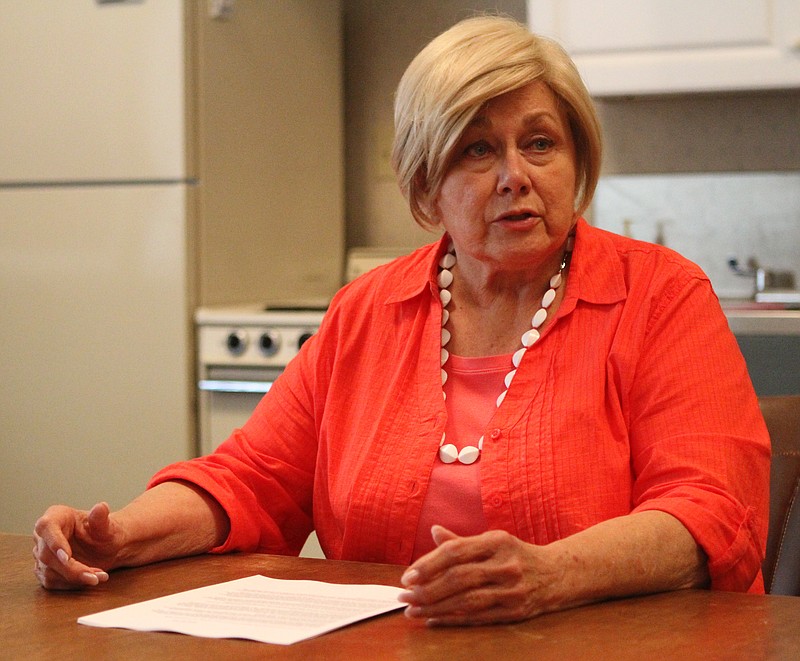To hear Commissioner Bebe Heiskell tell it, taking the reins of Walker County was like replacing a deadbeat dad.
When she took office in 2000, nobody had paid the utilities in three months. County leaders had hidden millions of dollars of debt. Financial analysts refused to give her a credit rating.
With time, Heiskell reflected during a recent public-access TV appearance, she pulled the county up, and it earned a "high grade" credit rating in 2008.
Then the economy tanked. And so did the county's rating, a little bit.
"Now, how horrible we are," she said, "It's down to A-minus. It's still a great credit rating. It's just not quite as good as it was."
But Heiskell did not mention a couple key details: One set of analysts looking at the county's finances in 2014 were pessimistic about its future, and analysts from a second agency withdrew their rating of Walker County after local officials didn't like the results.
Even so, Heiskell said on the local cable show she is optimistic about the county's future. She said the finances are more secure -- she fought the tide of shrinking reserves by raising property taxes by 64 percent, costing the average homeowner about $280 a year. She is also hopeful that most families will have more money with the opening this summer of Audia International, a Pennsylvania-based plastics manufacturer.
"It's better than it was last year," Heiskell said of the economy. "We've got a little more revenue coming in."
In 2003, for the first time under Heiskell, the county issued a general obligation bond -- a large loan it would pay back to several investors over several years. To get a good interest rate, Walker County needed an insurance company to back the loan.
The county finished repaying that bond in 2008 and issued another one the same year. This time, without help from an insurance company, the county earned a solid, double-A rating.
In 2014, Moody's rated the county's creditworthiness again. This time it dropped the rating to single-A, a score that is sightly worse but still assures investors that the county will probably be able to repay money it borrows. Around the same time, a second rating agency, Standard & Poor's, stopped evaluating Walker County when those analysts painted a worse picture than county officials wanted.
S&P gave Walker County a triple-B rating last May, telling investors they could loan Walker County money, so long as they were aware that the county's economy could get worse in the next couple of years.
While their ratings were different, both agencies gave Walker County a "negative" outlook. Both said Walker County didn't have enough money in reserves, and both worry that the county will be in trouble if it has to pay the $10 million it could owe Erlanger Health System, depending on how a federal lawsuit ends.
By comparison, Hamilton County received triple-A bond ratings from Moody's, S&P and Fitch. Dade County, Ga., received ratings of single-A from Moody's and double-A from S&P.
Bond ratings are important because they tell investors whether they can trust local governments looking for long-term loans. Counties with worse ratings usually have to pay higher interest rates, costing their taxpayers more money in the long run.
When S&P released its report on Walker County in May 2014, analysts said they were worried because the average family there makes less money than the typical American household. The analysts were also worried that Walker County leaders do not keep enough money in the bank. Rather than raising taxes for several years, Heiskell let the reserve fund dwindle, from $7 million in 2009 to $940,000 in 2013.
She said she didn't raise taxes as the county fought through the Great Recession because it would have hurt residents too much.
The S&P analysts highlighted one expense in particular during that time: In 2013, the county spent $1.4 million renovating Mountain Cove Farms, a venue in Chickamauga where the county hosts concerts and weddings.
Walker County bought 295 acres of the farm for $2.1 million in 2008. Of the financial audits from 2010-13 that are available online, only the 2012-13 audits show information about the farm.
In those years, records show, the farm operated at a loss of $340,000. Heiskell said she still wants to hold on to the property because it could make money, eventually. But she is open to selling it, given a good enough offer. She doesn't have a specific dollar amount in mind.
"For immediate financial relief," she said, "it would be a good thing. But it would be great for the people of Walker County to have (the farm)."
When S&P released its report, Walker County officials asked the analysts to stop rating the county. Ed Wall, the county's investment banker, said officials did that because the Moody's report gave a better rating, though investors would probably focus on the S&P outlook.
"It happens a lot," he said of the different ratings. "People are all different. Those organizations, sometimes they'll rate the same, and sometimes they don't."
Contact staff writer Tyler Jett at tjett@timesfreepress.com or at 423-757-6476.
